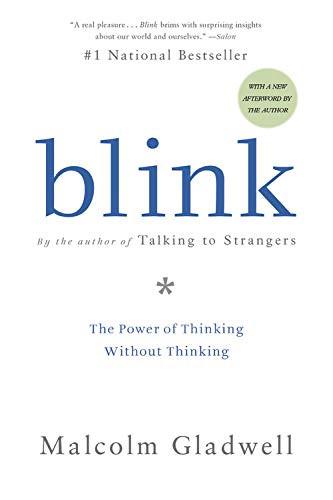Talha Mumtaz ✔️'s Key Ideas from Blink
by Malcolm Gladwell
Ideas, facts & insights covering these topics:
17 ideas
·11.1K reads
34
Explore the World's Best Ideas
Join today and uncover 100+ curated journeys from 50+ topics. Unlock access to our mobile app with extensive features.
Topics You Will Master Today
The Power of Thinking Without Thinking (Snap Judgments)
2. Thin-Slicing (Rapid Cognition)
3. Adaptive Unconscious (Automatic Processing)
4. Role of Experience (Intuition Development)
5. Priming Effects (Subconscious Influences)
6. Dark Side of Snap Judgments (Biases and Errors)
7. Expertise and Intuition (Skilled Intuition)
8. Warren Harding Error (Judgment Flaws)
9. Influence of First Impressions
10. Importance of Context
11. Art of Reading People (Nonverbal Cues)
12.Delicate Balance of Deliberation and Instinct
13. The Power of Immediate Decisions
108
1.11K reads
Truly successful decision-making relies on a balance between deliberate and instinctive thinking
MALCOLM GLADWELL
104
1.2K reads
The Power of Thinking without Thinking
Our brains often make split-second decisions without conscious thought. Gladwell explores how these snap judgments, though seemingly instantaneous, are informed by deep-seated knowledge and experience.
“We are innately equipped to make good decisions quickly.”
107
1.05K reads
Thin-Slicing
Thin-slicing refers to the ability to find patterns in narrow slices of experience. Gladwell demonstrates how people can make accurate judgments based on limited information.
“Thin-slicing is the process of finding patterns in events based only on narrow windows of experience.”
106
906 reads
The Adaptive Unconcious
Our unconscious mind processes vast amounts of information swiftly and efficiently. Gladwell highlights how this adaptive unconscious guides our instant reactions and decisions.
“The adaptive unconscious does an excellent job of sizing up the world.”
99
790 reads
The Role of Experience
Experience hones our intuitive abilities. Gladwell explains that seasoned professionals often rely on intuition developed through years of practice and exposure.
“Intuition is the product of experience and expertise.”
102
688 reads
Priming Effects
Priming can subtly influence our perceptions and decisions. Gladwell discusses how exposure to certain stimuli can shape our subsequent thoughts and behaviors.
“Priming affects our reactions to situations, often without our awareness.”
104
634 reads
The Dark Side of Snap Judgements
Not all snap judgments are accurate. Gladwell examines the pitfalls of relying on intuition, including biases and errors that can lead to flawed decisions.
“Snap judgments are often vulnerable to biases that distort reality.”
102
559 reads
Expertise & Intuition
True intuition is rooted in deep knowledge and practice. Gladwell emphasizes that experts make quick decisions based on extensive, internalized information.
“The power of intuition is most evident in those with vast experience.”
100
528 reads
Our snap judgments and first impressions can be astonishingly accurate, but they can also be disastrously wrong.
MALCOLM GLADWELL
103
529 reads
The Warren Harding Error
Named after the U.S. president, this error occurs when superficial traits influence our judgments. Gladwell warns against letting irrelevant factors sway our decisions.
“We must be cautious of superficial characteristics that cloud our judgment.”
100
507 reads
The Influence of First Impressions
First impressions can be remarkably accurate but also misleading. Gladwell explores how these immediate assessments can shape our perceptions and interactions.
“First impressions are formed quickly and can be hard to change.”
101
489 reads
The Importance of Context
Context heavily influences our decisions. Gladwell explains how surroundings and situational factors can alter our judgments and behaviors.
“Our decisions are deeply affected by the context in which they are made.”
100
477 reads
The Art of Reading People
Nonverbal communication plays a crucial role in our judgments. Gladwell discusses how subtle cues like body language and facial expressions impact our perceptions.
“We are constantly interpreting nonverbal signals in our interactions.”
101
460 reads
The Delicate Balance of Deliberation& Instinct
Effective decision-making involves balancing intuition with analysis. Gladwell suggests that knowing when to trust our gut and when to deliberate is key.
“Balancing instinct with careful thought leads to better decisions.”
101
421 reads
The Power of Immediate Decisions
Immediate decisions can be surprisingly effective. Gladwell highlights instances where snap judgments outperform prolonged deliberation.
“Sometimes, quick decisions are the best decisions we can make.”
102
373 reads
100
404 reads
IDEAS CURATED BY
Today's readers, tomorrow's leaders. I explain handpicked books designed to transform you into leaders, C-level executives, and business moguls.
CURATOR'S NOTE
Discover the hidden power of thinking without thinking with Malcolm Gladwell’s “Blink.”
“
Curious about different takes? Check out our Blink Summary book page to explore multiple unique summaries written by Deepstash users.
Different Perspectives Curated by Others from Blink
Curious about different takes? Check out our book page to explore multiple unique summaries written by Deepstash curators:
10 ideas
Oscar Moss's Key Ideas from Blink
Malcolm Gladwell
4 ideas
Lance Lucas's Key Ideas from Blink
Malcolm Gladwell
1 idea
TITTO SEBASTIAN's Key Ideas from Blink
Malcolm Gladwell
Discover Key Ideas from Books on Similar Topics
18 ideas
Outliers
Malcolm Gladwell
12 ideas
The Elements of Choice
Eric J. Johnson
15 ideas
Quiet
Susan Cain
Read & Learn
20x Faster
without
deepstash
with
deepstash
with
deepstash
Personalized microlearning
—
100+ Learning Journeys
—
Access to 200,000+ ideas
—
Access to the mobile app
—
Unlimited idea saving
—
—
Unlimited history
—
—
Unlimited listening to ideas
—
—
Downloading & offline access
—
—
Supercharge your mind with one idea per day
Enter your email and spend 1 minute every day to learn something new.
I agree to receive email updates









